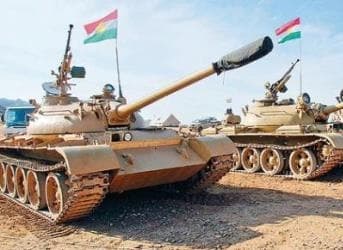In the rapidly unfolding events and chaos in Iraq, leaders of the semi-autonomous region of Kurdistan have capitalized on the situation to gain further leverage over the central government in Baghdad. As the militant Sunni group ISIS rolled up towns and cities and moved south toward the capital, the Kurdish Regional Government (KRG) seized Kirkuk, an oil-rich city whose control has long been in dispute between Kurds and the Iraqi government.
ISIS fighters, within a week, have pushed Iraq to the precipice. First was the fall of Mosul. Then, in quick fashion, ISIS moved south in pickup trucks and took Tikrit. Now, threatening Baghdad, the security situation is taking a turn for the worse. On June 13, the Grand Ayatollah Ali Sistani, Iraq’s highest Shiite cleric, issued a decree calling on his followers to take up arms against the Sunni ISIS.
This portends a violent struggle of an increasingly sectarian nature. As people are forced to choose sides, Iraqi Sunni and Shiite civilians will likely get swept up in the fight.
Meanwhile, Kurdistan has seized Kirkuk and other areas surrounding it; occupation now goes beyond the KRG’s official administrative area. In Kirkuk, with Iraqi security forces having abandoned their post, looters seized equipment and weapons from an Iraqi base.
The KRG insists that it sent the Peshmerga -- Kurdish security forces -- to Kirkuk in order to protect the city from ISIS fighters. While that is surely true to a certain degree, the ramifications of the Kurdish move to occupy disputed territory will reverberate more broadly.
In a press statement, the KRG assailed the Iraqi security forces and the Maliki government for incompetence and unwillingness to address militants. Lieutenant General Jabbar Yawar, spokesperson of the Peshmerga, said that for quite some time Kurdistan has pressured Baghdad to do more. “Especially in Ninewa, Salahaddin and Anbar governorates, the Iraqi security agencies and ministries have been incapable and soldiers and employees were only interested in collecting their salaries,” he said, adding, “Baghdad did not heed the KRG’s warnings and now, unfortunately, our predictions have come to pass.”
Earlier, Iraq’s foreign minister, Hoshyar Zebari, said Iraq was facing a “mortal threat” and that there would be “closer cooperation between Baghdad and the Kurdistan regional government to work together and try to flush out these foreign fighters.”
But the hostile language directed at Baghdad by the KRG suggests that cooperation may not be at the top of the agenda for the Kurds at this stage. The KRG may be trying to shore up defenses against ISIS, but they are also likely eyeing the longer game.
The seizure of Kirkuk would have been unthinkable before this week, but with Iraqi security forces not only displaying its inability to control large population centers from ISIS fighters, they have little appetite to confront Peshmerga forces – who are considered the best trained and most disciplined soldiers in Iraq – from consolidating territory beyond the Kurdish borders. When the smoke clears, the result could be a permanent territorial gain for Kurdistan.
Related Article: Mosul Falls to Insurgents, Threatening Iraqi Oil Sector
The developments will impact Kurdistan’s oil prospects in that the violence and political upheaval could bring investment in Iraq’s oil sector to a standstill. “All the oil companies are on alert,” Daniel Yergin, an oil historian, told The New York Times. “They are going to worry about the security of their people and installations. Obviously, no one is going to do anything new. Confidence about the growth of Iraqi oil output becoming a key element of stability in the world oil market is now in question.”
Moreover, the violence will delay oil exports from Kurdistan. A major pipeline that carries Kurdish oil to Turkey has been offline due to an act of sabotage that preceded ISIS’s gains last week. But the violence will doom attempts to repair the pipeline anytime soon, delaying major Kurdish oil exports.
Still, Kurdistan has clearly strengthened its hand vis-à-vis Baghdad. Up until now, Maliki’s government has hampered Kurdistan’s efforts to directly export oil while the two sides argue over oil governance.
But Kurdistan has strengthened its hand by occupying territory, a move that Baghdad is obviously unable to roll back. And as the Maliki government grows more desperate, it may be willing to make significant concessions to the KRG over oil exports for its cooperation against ISIS.
Finally, Kurdistan’s aggressive moves in the face of Maliki’s weakness could bring the goal of Kurdish independence much closer. It has long had enough oil to build an independent economy, but the KRG has now demonstrated it has enough political and military strength to defy Baghdad.
By Nick Cunningham of Oilprice.com



















The northern pipeline that was damaged by insurgent attack and is offline is Iraq's. The Kurds have their own pipeline into Turkey and it is functioning, and at least two cargoes of Kurdish crude have set sail from Ceyhan. One is reported to have been sold to Gazprom to be sent to a refinery in Germany that is jointly owned by Gazprom and BP.
That should have read Rosneft not Gazprom.
The maps I've seen don't show this - I see *one* pipeline running north into Turkey (the Kurdish lines tie into this trunk line).
Can anyone provide a link to a map illustrating these direct Kurdish-to-Turkey pipelines?